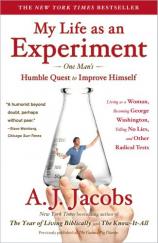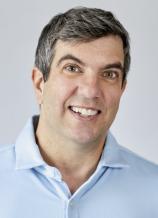Excerpt
Excerpt
The Guinea Pig Diaries: My Life As an Experiment

INTRODUCTION
Over the years, I’ve gotten a lot of suggestions.
Some are intriguing. My brother-in-law suggested I spend a year
growing my own food in my Manhattan apartment.
Some are intriguing, but possibly come with a hidden agenda. A
friend – I think he’s a friend -- told me I should
spend a year without human contact.
Some definitely come with an agenda. My wife keeps
suggesting that I spend a year giving her foot massages. I usually
counter-offer that we could try all the positions in the Kama
Sutra. The subject is generally dropped after that.
The suggestions come with the territory. For the last fifteen
years, I’ve attempted to live my life as a human guinea pig.
I’ve engaged in a series of experiments on my mind and body,
some of which have been fruitful, some humiliating failures.
I’ve tried to understand the world by immersing myself in
extraordinary circumstances. I’ve grown a tremendously
unattractive beard.
My career as a human guinea pig began with a piece of furniture. I
was working at Entertainment Weekly magazine in the
mid-1990s, and the La-Z-Boy company had just created the most
pimped-out, excessive chair in the history of human seating. It
pushed the concept of leisure – or sloth, if you are feeling
moral – to unheard-of extremes. It had a butt massager, a
heater, a built-in fridge for you to store beers and cheese sticks,
a modem jack -- everything but a toilet and an outboard
motor.
I figured the only way to address this magnificent monstrosity was
to road test it. See how it held up under severe conditions. Being
a committed journalist, I offered to spend 24 hours watching TV in
this La-Z-Boy and then write about it.
The experiment was actually a bit of a bust. Somewhere in the
middle of a Law & Order marathon at 3 a.m., I fell
asleep for five hours. But I glimpsed the possibilities of this
type of journalism offered. I was hooked.
Since then, I’ve put myself (and my patient wife) through a
battery of experiments, the highlights and lowlights of which are
in this book.
To understand the global phenomenon that is outsourcing, I
outsourced everything in my life. I hired a team of people in
Bangalore, India to answer my phone, answer my email, argue with my
wife for me. This, by the way, was probably the best month of my
life.
To explore the meaning of Truth, I decided to practice something
called Radical Honesty. I spent a month without lying. But more
than that, I vowed to say whatever popped into my head. No filter
between the brain and the mouth. This, by the way, was probably the
worst month of my life.
To slow the descent of my rapidly plummeting IQ, I read the
Encyclopedia Britannica from A to Z.
To try to understand religion, I lived by the rules of the Bible,
from the Ten Commandments all the way down to stoning
adulterers.
I’ve been told – many, many times – that there
are easier ways to make a living.
Which is true.
But I’m addicted to these experiments. I’ve come to
believe that if you really wanted to learn about a topic, you
should get on-the-job training. You should dive in and try to live
that topic. If you’re interested in Rome, you can look at
maps and postcards and read census data. Or you can actually go to
Italy and taste the pesto gnocchi. As the old saying goes: To
understand the Italians, you must walk a mile in their
loafers.
If you’re passionate about the project and committed to the
possibility of change, there’s nothing like it. And these
experiences have, in fact, transformed my life for good. I may not
keep everything from each experiment – after my year of
living biblically, I decided maybe I should stop stoning adulterers
and I put away my robe and sandals. But I do still observe the
Sabbath, I still say prayers of thanksgiving every day (even though
I’m an agnostic, go figure), I still try not to covet and
gossip, with varying degrees of success.
The goal is that the pain of the experiment will end up making life
better in the end. And that my wife will forgive me. For, as
I’ve been told many times, she’s a saint. A saint, I
might add, who doesn’t tolerate these experiments lying down.
(With the encyclopedia project, for instance, she fined me $1 for
every irrelevant fact that I inserted into conversation).
Partly, of course, I’m drawn to these experiments
because I’m a writer. And a writer who is cursed with a
relatively uneventful upbringing. My dad was not a carnie or a
drunk or a spy. My ordinary life doesn’t merit a book. So I
put myself into extraordinary situations, and see what
happens.
One of my literary idols is George Plimpton. He’s the Dante
of participatory journalism. For the sake of the story, he’s
been sacked by a Detroit Lions defensive lineman and punched in the
face by Archie Moore. Before him, there was John Howard Griffin,
who chemically darkened his skin to see how it felt to be a black
man in the 1950s South. And even before that came an amazing 19th
century journalist named Nelly Bly. Her experiments ranged from the
madcap -- when Jules Verne’s book Around the World in
Eighty Days came out, she decided to try to replicate the
stunt – to the serious – she had herself committed to
an infamous New York insane asylum to expose the abuses
there.
And when I read the encyclopedia, I found a whole other breed of
heroes who experimented on themselves for actual science -- usually
because no one else would volunteer. There’s a great 19th
century doctor named Jesse William Lazear, who allowed himself to
be bitten by a yellow fever-infected mosquito to prove that the
insects were spreading the disease. He died proving himself right.
And there’s Sasha Shulgin, the Thomas Edison of psychedelics.
A true mad scientist based in Berkeley (of course), the 84-year-old
chemist has invented 230 different hallucinogenic drugs. He then
ingests them himself. “It is like opening a door to a hallway
that has unopened doors for its entire length, and beyond every
door is a world with which you are totally
unfamiliar.”
I haven’t taken drugs since college. But I know exactly what
he means about opening doors. That’s what I’ve tried to
do in my career and in this book, The Guinea Pig Diaries. I hope
you like what I’ve found behind them.
Excerpted from THE GUINEA PIG DIARIES: My Life as an Experiment
© Copyright 2011 by A.J. Jacobs. Reprinted with permission by
Simon & Schuster. All rights reserved.
The Guinea Pig Diaries: My Life As an Experiment
- Genres: Humor
- paperback: 272 pages
- Publisher: Simon & Schuster
- ISBN-10: 1439104999
- ISBN-13: 9781439104996




